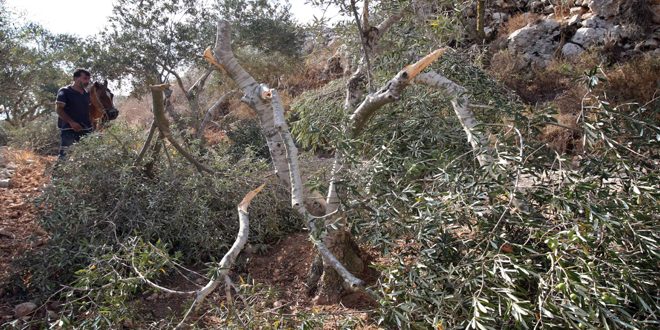Today, Israeli settlers stole the olive crops of al-Jabaa village, southwest of the southern West Bank city of Bethlehem, and cut branches of trees, the head of al-Jabaa village council Diab Mashaleh asserted.
He told WAFA news agency that al-Jabaa villagers discovered -when they reached their land- that settlers from the illegal Beit Ain settlement had stolen their crops from about 100 dunums of land owned by 30 people and that the settlers have also chopped branches of the trees.
Mashaleh said the landowners have been trying to reach their lands for a while but the Israeli occupation forces prevented them from getting there telling them that they should obtain a special permit first from the Israeli military government.
When the farmers were finally able to reach their lands after getting the permission, they discovered the theft of their crops and the vandalism of the trees.
Nevertheless, the village mayor said that despite having a permit from the Israeli army to reach their lands, settlers attacked the farmers and forced them to leave the area under the threat of weapons.
Mashaleh said these attacks are repeated every year during the olive harvest season and that the Israeli occupation forces always cover the settlers’ theft of the crops and their attacks against the Palestinian farmers.
In Ramallah, Israeli settlers attacked Palestinian farmers harvesting their olive crops in the village of Burqa, injuring two, according to Walid Assaf, head of the Wall and Settlements Resistance Commission.
Assaf said: “Farmers supported by dozens of volunteers, were able to reach their lands in Burqa, which they have been denied access to for years by the Israeli occupation army, and started to harvest their olive trees. But settlers descended on them and attacked them.”
He added the settlers, who came from the illegal Megron settlement, were protected by the soldiers when they attacked the farmers in an attempt to get them to leave their land and injured two of them.
“The volunteers and farmers confronted the settlers and were able to fend them off,” he affirmed.
Rights organizations have documented a sharp rise in Israeli settlers’ attacks against Palestinian farmers harvesting their olive trees or stealing their crops and of soldiers banning farmers from reaching their land in areas close to the illegal settlements or located beyond Israel’s apartheid.
Basma Qaddour

